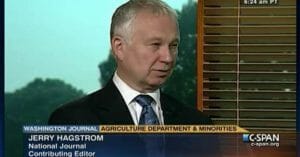This blog post was written by Arizona State University graduate student Katie Poirier. In addition to studying Food Policy and Sustainability Leadership at ASU, Katie is the Executive Director of the Mollen Foundation where she works to empower Arizona youth and families to adopt healthy habits through engaging gardening, cooking, mindfulness, and physical activities.
After a week full of meetings on and off Capitol Hill, students of the Swette Center for Sustainable Food Systems gathered back at the ASU D.C. headquarters to hear from expert agricultural journalists, Jerry Hagstrom of The National Journal and The Hagstrom Report, and Liz Crampton and Catherine Boudreau* of Politico. Liz, Catherine, and Jerry are based out of Washington D.C. and report on issues related to agriculture, food, restaurants, landscaping, food stamps, the Farm Bill, etc. Competitors and friends, all three reporters agreed that their success depends on getting out there, asking questions quickly, being accurate, and reporting the news first. They seek the same thing when creating a story: discovering what is most interesting in the moment and figuring out who will be reading their stories. Readers of their publications include production, anti-hunger, farm, ranch, grocery, government, law, nonprofit, and conservation audiences.
After introducing themselves, the reporters shared why they were drawn to agricultural reporting. Growing up on a farm in North Dakota, and bored of farm life, Jerry didn’t foresee a life in agricultural journalism but noted that agriculture “touches every corner of our society.” Liz and Catherine, on the other hand, both gravitated toward agricultural stories while in college.
Politico is an international news reporting agency, with over 500 staff. Besides the basic Politico that covers policy and political news broadly, there are three publications dedicated to agriculture: a paid subscription newsletter Politico Pro Agriculture distributed daily at 6 am EST, a free version of the paid newsletter called Morning Ag, sent out at 10 am EST, and Weekly Agriculture, sent out Mondays at 10 am EST. You might wonder why people pay for a subscription for something that can be had free just four hours later. The answer is that with information comes power and being among the first to know can be an advantage in navigating DC politics.
A subscription to The Hagstrom Report is provided to all students enrolled in the Food Policy and Sustainability Leadership Professional Certificate program. It is frequently referenced in our cohort’s online discussions and greatly informs our day to day work. The publication’s breadth and depth on agricultural issues reveal years of networking, consulting, and friendship. It is my suspicion that the study of food has given Jerry, and no doubt will give Liz and Catherine, a lifetime of abundant substance, character, drama, and wonder. Agriculture as a sector provides no end to rich and compelling stories.
The importance and power of communication, embedded with details and specifics, became very apparent throughout my time in the D.C. Immersion course. While reflecting on the presentations from the press, I observed numerous and varied strategies. Catherine answers cold calls, Jerry takes few advertisements, Liz sources stories from people who write to her email account, which, she explained, is why many reporters publish their email addresses at the end of their stories.
As initial efforts to curb the Covid-19 virus unfolded in front of our eyes, these reporters were in the eye of the storm, covering relief packages, international trade, school meals, state reimbursements, SNAP eligibility, and impacts on farmers and ranchers. As we were meeting, decisions to shut down the U.S. Capital, congressional member offices, and monuments were being made all around us. But nothing could stop these reporters from getting out the news. I’ve continued to follow these reporters as the pandemic has unfolded, and they continue to share news of current Covid-19 impacts that engages readers and informs them about the national scale of agriculture, its economics, and its intricate culture.
As the pandemic has all too clearly shown, Jerry is correct. There is no area of this world that agriculture does not influence.
As long as we continue to communicate with each other and as long as we continue to need food, there will continue to be interesting and passionate agricultural journalism with dedicated writers like Jerry, Catherine, and Liz holding the pen.
On behalf of the entire ASU Food Policy and Sustainability Cohort, we would like to extend our sincere appreciation to Jerry, Liz, and Catherine for taking the time to meet with us and for their dedication to truth, facts, and effective journalism. We also highly recommend following both Jerry (@hagstromreport) and Politico’s Morning Agriculture newsletter (@Morning_Ag) on twitter!
*Since the time of this writing Catherine Boudreau has transitioned into the position of sustainability policy reporter at Politico. We congratulate Catherine on this move and look forward to reading more of her work on sustainability in all sectors!
It’s hard to believe but the fall semester is right around the corner and time is running short to apply to be part of the 2021 cohort of Food Policy Leaders at ASU! If you’re interested, don’t delay! Check out the website for the Food Policy and Sustainability Leadership Program at ASU for more info and to apply today.

